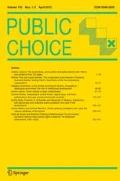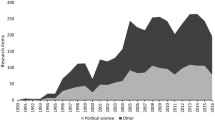Abstract
Electoral competition between two expert candidates may lead to inefficient platform choices. The present paper studies electoral competition between two experts and a third uninformed candidate. The latter behaves populistically. This seemingly useless candidate restores efficiency. The paper then endogenizes information acquisition. If the information acquisition costs are low, then equilibria with (i) three expert candidates or (ii) two experts and one uninformed candidate may arise. There are costs such that the latter equilibrium is the only pure strategy equilibrium in which information is transmitted.
Similar content being viewed by others
References
Ashworth, S., & Shotts, K. W. (2008). Does informative media commentary reduce politicians’ incentives to pander? (Working paper).
Baron, D. P. (2006). Persistent media bias. Journal of Public Economics, 60, 1–36.
Canes-Wrone, B., Herron, M. C., & Shotts, K. W. (2001). Leadership and pandering: A theory of executive policymaking. American Journal of Political Science, 45(3), 532–550.
Canovan, M. (1981). Populism. New York: Harcourt Brace Jovanovich.
de Condorcet, M. (1785). Essai sur l’application de l’analyse à la probabilité des decisions rendues a la pluralité des voix. Paris: L’imprimerie royale.
Cukierman, A., & Tommasi, M. (1998). When does it take a Nixon to go to China? American Economic Review, 88, 180–197.
Cummins, J. G., & Nyman, I. (2005). The dark side of competitive pressure. The RAND Journal of Economics, 36(2), 361–377.
Felgenhauer, M., & Grüner, H. P. (2008). Committees and special interests. Journal of Public Economic Theory, 10(2), 219–243.
Frisell, L. (2009). A theory of self-fulfilling political expectations. Journal of Public Economics, 93(5–6), 715–720.
Gentzkow, M., & Shapiro, J. M. (2005). Media bias and reputation. Journal of Political Economy, 114, 280–316.
Hanson, R. (2005). He who pays the piper must know the tune (Working paper).
Harrington, J. E. (1993). Economic policy, economic performance, and elections. American Economic Review, 83, 27–42.
Heidhues, P., & Lagerlöf, J. (2003). Hiding information in electoral competition. Games and Economic Behavior, 42, 48–74.
Laslier, J.-F., & Van der Straeten, K. (2004). Electoral competition under imperfect information. Economic Theory, 24, 419–446.
Loertscher, S. (2008). Information transmission in electoral competition (Working paper).
Martinelli, C. (2001). Elections with privately informed parties and voters. Public Choice, 108, 147–167.
Morris, S. (2001). Political correctness. Journal of Political Economy, 109(2), 231–265.
Rubinstein, A. (1985). Choices of conjectures in a bargaining game with incomplete information. In Roth, A. (Ed.), Game theoretic models of bargaining (pp. 99–144). Cambridge: Cambridge University Press.
Schultz, C. (1995). The politics of persuasion when voters are rational. Scandinavian Journal of Economics, 97, 357–368.
Schultz, C. (1996). Polarization and inefficient policies. Review of Economic Studies, 63, 331–344.
Wärneryd, K. (1994). Partisanship as information. Public Choice, 80, 371–380.
Author information
Authors and Affiliations
Corresponding author
Rights and permissions
About this article
Cite this article
Felgenhauer, M. Revealing information in electoral competition. Public Choice 153, 55–68 (2012). https://doi.org/10.1007/s11127-011-9773-3
Received:
Accepted:
Published:
Issue Date:
DOI: https://doi.org/10.1007/s11127-011-9773-3




